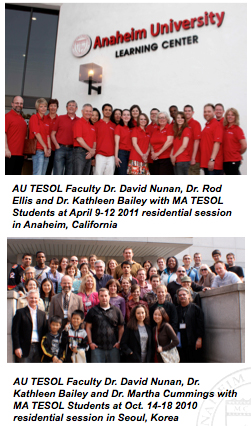Experience Anaheim University's Online Education
Ed.D. in TESOL > MA in TESOL > Grad. TESOL Diploma > Undergrad. TESOL Diploma > TESOL Certificate > Teaching English to Young Learners Certificate
TESOL vs. TEFL
TESOL Residential Sessions

Residential Sessions at Anaheim University TESOL Retreat
- Attendance at 2 four-day intensive residential sessions are required during the MA in TESOL program
- Study face-to-face with AU's renowned TESOL faculty and students from around the world
- Explore "TESOL in Practice" and "Theoretical & Empirical Perspectives on TESOL" topics. Students attend "TESOL in Practice" during their first residential session and"Theoretical & Empirical Perspectives on TESOL" during their 2nd residential session.
- Residential sessions are held in California and other select locations.
- In the past, residential sessions have been held on the campuses of:
- California State University Fullerton in Fullerton, California
- Alliant International University in San Diego, and Irvine California
- University of Hawaii in Honolulu, Hawaii
- Sookmyung Women's University in Seoul, Korea
- Hankuk University of Foreign Studies in Seoul, Korea
- classroom facilities in Tokyo, Japan
- Click here to see photos of the October 2011 residential session in Seoul, Korea
- Click here to see photos of the September 2011 residential session in Bogota, Colombia
- Click here to see photos of the April 2011 residential session in Fullerton, California
- Click here to see photos of the October 2010 residential session in Seoul, Korea

When & How Long?
Why Study Online?
Admissions & Enrollment Questions
Entrance Requirements
1. TESOL Doctor of Education (Ed.D)
An application for the TESOL Doctor of Education (Ed.D) Program must include the following:
- Application form
- Application fee ($75)
- One recent color photograph (digital is okay).
- Official transcripts, licenses or certificates. The Ed.D in TESOL Program requires a Masters degree in TESOL or Applied Linguistics or in a relevant area of Education required from an accredited institution recognized by the US Department of Education and/or CHEA, or by the government of the country in which the degree was awarded, and with an overall GPA of no less than 3.0 on a 4.0 scale, or equivalent from non-USA Institutions.
- A resume documenting a minimum of 4 years experience in some aspect of TESOL (teaching, teacher education or publishing).
- An outline (1,000 words) of the research that the applicant envisions undertaking for the dissertation.
- Three references attesting to personal and professional qualifications. One reference must be from each of the following:
- A recent employer.
- A TESOL professional who can attest to the applicant’s potential as a doctoral student.
- A member of the academic faculty where the applicant completed his/her MA.
- Non-native English speakers must demonstrate college-level proficiency (see “Admissions and Enrollment Questions” for a complete list of how to demonstrate college-level proficiency).
Once your application materials have been approved, you will need to submit an Enrollment Agreement and tuition payment to complete the enrollment process.
2. TESOL: Master of Arts (MA) and Graduate Diploma
An application for a TESOL Master of Arts (MA) or a TESOL Graduate Diploma must include the following:
- Application form
- Application fee ($75)
- One recent color photograph (digital is okay).
- Official undergraduate transcripts from an accredited institution recognized by the US Department of Education and/or CHEA, or by the government of the country in which the degree was awarded, in a sealed envelope from the awarding institution.
- A resume.
- A brief statement (300-400 words) indicating why you have selected the Anaheim University program, what you hope to get out of it, and how it will help you in your present and future career.
- Non-native English speakers must demonstrate college-level proficiency (see “Admissions and Enrollment Questions” for a complete list of how to demonstrate college-level proficiency).
Once your application materials have been approved, you will need to submit an Enrollment Agreement and tuition payment to complete the enrollment process.
3. TESOL Undergraduate Diploma
An application for a TESOL Undergraduate Diploma must include the following:
- Application form
- Application fee ($50)
- One recent color photograph (digital is okay).
- Official high school transcripts or equivalent (GED, certificate of high school equivalency, documentation of completion of state-approved home school program, DD214 military form indicating high school completion) from an accredited institution in a sealed envelope from the awarding institution.
- Non-native English speakers must demonstrate college-level proficiency (see “Admissions and Enrollment Questions” for a complete list of how to demonstrate college-level proficiency).
Once your application materials have been approved, you will need to submit an Enrollment Agreement and tuition payment to complete the enrollment process.
4. TESOL Certificate and Teaching English to Young Learners (TEYL) Certificate
An application for a TESOL Certificate or a Teaching English to Young Learners (TEYL) Certificate must include the following:
- Application form
- Application fee ($50)
- One recent color photograph (digital is okay).
- Non-native English speakers must demonstrate college-level proficiency (see “Admissions and Enrollment Questions” for a complete list of how to demonstrate college-level proficiency).
Once your application materials have been approved, you will need to submit an Enrollment Agreement and tuition payment to complete the enrollment process.
Residency Requirements
Student Support
Tuition & Fees Payments
Withdrawal from Program
Accreditation and State Approval
